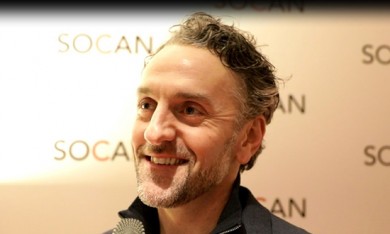Everyone has a story about a song that reflects the healing and transformative power of music. The Awesome Music Project Canada: Songs of Hope and Happiness, contains 111 of them, told by a wide cross-section of Canadians; musicians, artists, authors, and other people from all walks of life.

Rob Carli
“It could easily have had many more, but we had to cut it off somewhere,” says award-winning TV and film composer Rob Carli, who compiled the book with his neighbour, Terry Stuart, Chief Innovation Officer at Deloitte Canada.
“It started with an over-the-fence kind of conversation,” says Carli, explaining that Stuart asked him if there was some kind playlist that might be universally beneficial for people’s happiness and mental health. “I said, ‘Terry, that’s not the way music works. It’s subjective. Your happy song and mine, they’re going to be completely different. In fact, yours may be a complete turn-off to me,’ But after he showed me a couple of stories, I realized it’s really about the narrative – why music does what it does to people – and I became fascinated with that question.”
The Awesome Music Project is more than a book; it’s an ongoing campaign to accelerate the discovery of solutions to mental health issues using music, with all proceeds going to the Centre for Addiction and Mental Health’s CAMH/MaHRC Joint Music Therapy Research Project Team; a project studying how music impacts brain chemistry, in the hope of finding data to help treat patients in a non-pharmaceutical way.
“I realized it’s really about the narrative – why music does what it does to people.” – Co-Author Rob Carli
Just as everyone has a story about how a song impacted their lives, many have stories about how mental health challenges have affected them, or someone they know. “One in two Canadians, by the time they’re 40, will have been impacted somehow by those challenges, through someone in their life,” says Carli.
Settling on World Mental Health Day – October 10th 2019 – as their release date for their book, Carli and Stuart set about collecting stories, with the help of Vancouver-based publisher Page Two. “They’re a unique force in Canadian publishing,” says Carli, describing them as “a big publisher with the compassion and personalization of an indie record label. They guided us but always solicited our input.
The Power of Music: Excerpts from the Book
- “Singing and playing music made me feel free, unburdened, and joyful. Music released me from my loneliness by connecting me to something bigger.” – Sarah McLachlan
- “Music gave me a way to deal with the most harrowing thing I had yet faced in my life, a way to say the kind of things I would have said if I’d known how.” – Col. Chris Hadfield
- “I had a dark side, a sadness, but I kept it hidden, except when I made music.” – Elisapie Isaac
- “I never fit in and was always the outsider… until I discovered music. At age 12 I received a 29-dollar guitar that changed my life forever.” – Bob Egan
“We used a lot of Terry’s contacts, and my contacts in the music business, but Page Two helped track down contributors,” Carli says, adding that there were three chapters to the project: the creation of the book, promoting it, and fundraising. “I’ve never done anything like this before, so it was really gratifying learning – not only about charities, fundraising, and mental health and music – but about working with different teams than I’m used to. It’s a different world from sitting in my studio writing music,” he says, laughing.
Carli also singles out editor, writer, and publishing consultant Scott Steedman as integral to the process, in collecting, editing and compiling stories – by contributors ranging from the likes of Sarah McLachlan and astronaut Chris Hadfield, to Steedman’s eight-year-old daughter, Rose.
The 111 stories speak volumes about the healing power of music, and are backed up with entries detailing how music affects the brain, resources and advice concerning music therapy, and articles covering neurological research initiatives that confirm music’s role in improving physical and mental health overall.
And more stories will be told. Since the conception of The Awesome Music Project in early 2019, it’s evolved into far broader campaign, with plans in the works for online companion initiatives, and fundraising events – similar to those held recently in Toronto and Kitchener-Waterloo, which bring together contributors to the book and musicians performing the songs that inspired their stories.
“This is how we’re relevant across the country,” Carli says, “as we go into communities and partner with whoever is working in the mental health space and help them raise money. So it’s not a journey that really ever ends.”